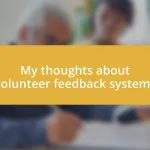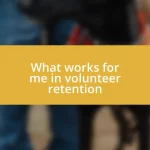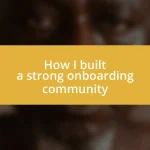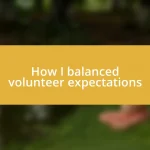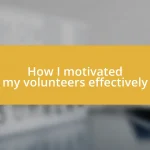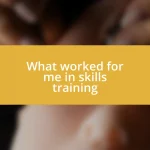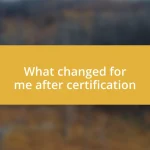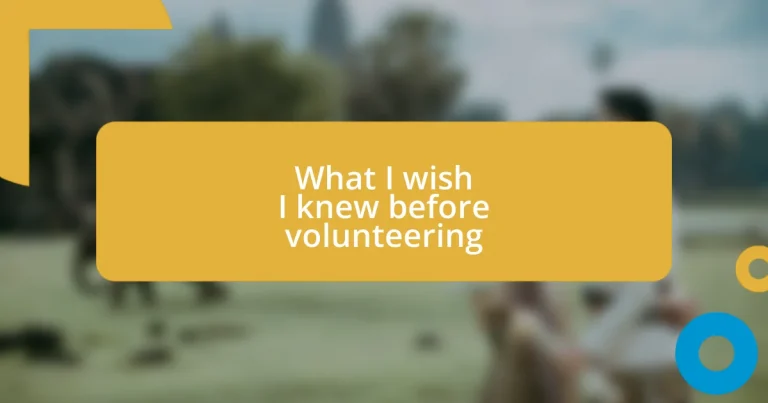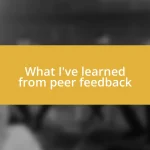Key takeaways:
- Effective communication and understanding of one’s skills and interests are crucial for a fulfilling volunteering experience.
- Building relationships through genuine interactions and vulnerability enhances the impact of volunteering and fosters community connections.
- Reflecting on experiences, learning from feedback, and recognizing the value of small contributions can deepen personal growth and motivation in volunteer work.
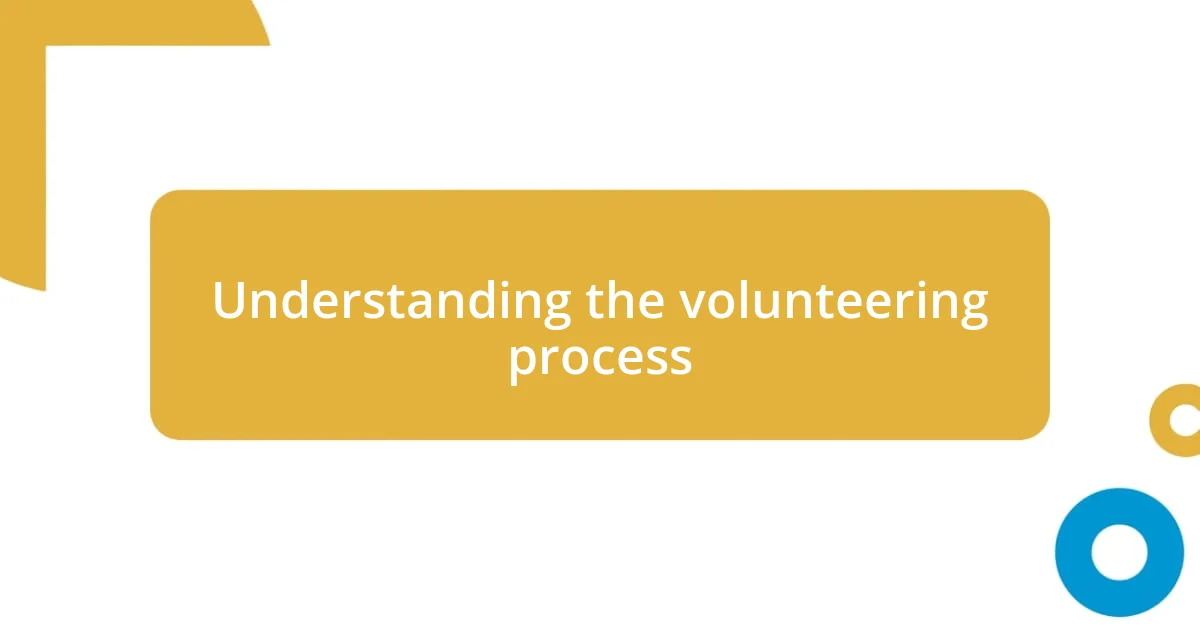
Understanding the volunteering process
Understanding the volunteering process can be a journey of self-discovery as much as it’s a commitment to helping others. When I first volunteered at a local food bank, I vividly remember the initial confusion about whom to approach and what tasks were expected of me. Have you ever found yourself standing at the entrance of an organization, feeling both excited and anxious about how to start?
As you navigate through this process, it’s crucial to communicate openly with the organization about your skills and expectations. I once hesitated to share my background in education, thinking it might be irrelevant, but it turned out to be essential for the tutoring program I joined. Have you considered how your unique experiences might shape your role as a volunteer?
Lastly, don’t underestimate the importance of training sessions or orientations. They’re not just formalities; they’re gateways to understanding the mission, values, and operations of the organization. I recall attending an orientation where I learned not just the “how” but also the “why” behind the organization’s work, igniting my passion and commitment. What insights have you gained from similar experiences?
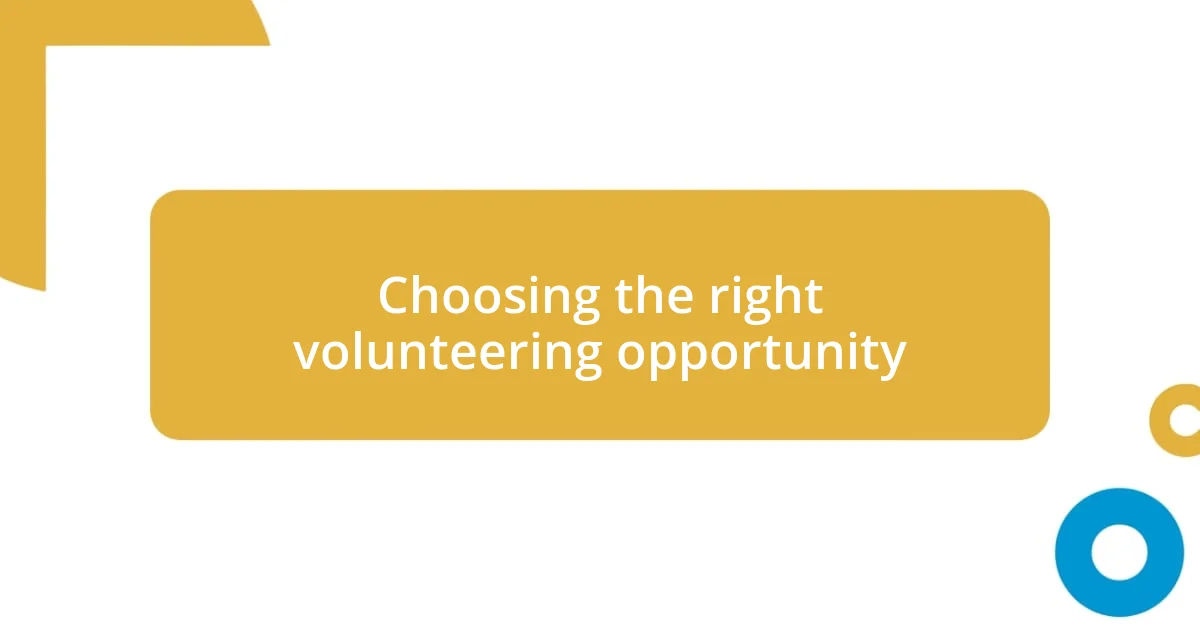
Choosing the right volunteering opportunity
Choosing the right volunteering opportunity can feel overwhelming, especially with so many options available. When I started volunteering, I quickly realized that my passions and skills didn’t always align with the needs of the organization. For instance, I once jumped into a conservation project, drawn by my love for nature, but found myself struggling with the physical demands. Have you ever taken on a role that turned out to be more challenging than you anticipated?
It’s important to reflect on what truly excites you about volunteering. I learned this lesson the hard way after signing up for an event planning role that didn’t resonate with my strengths. I ended up feeling disconnected and uninspired. Instead, when I matched my volunteer work with what I enjoyed, like mentoring youth, I felt much more fulfilled and engaged. Have you identified your own interests that could guide your decision?
Ultimately, a thoughtful approach to choosing where to volunteer can make all the difference. Spend time researching organizations, reading reviews, and understanding their missions. I remember feeling a true sense of belonging when I discovered a local animal shelter aligned with my values, and my enthusiasm blossomed from there. How do you think your values could steer you toward the right opportunity?
| Criteria | Considerations |
|---|---|
| Skills | Assess how your skills can benefit the organization and align with their needs. |
| Interests | Identify causes you’re passionate about to ensure a meaningful experience. |
| Time Commitment | Evaluate your schedule and the time required by the organization. |
| Location | Consider the location and accessibility for regular volunteering. |
| Reputation | Research the organization’s reputation to ensure they align with your values. |
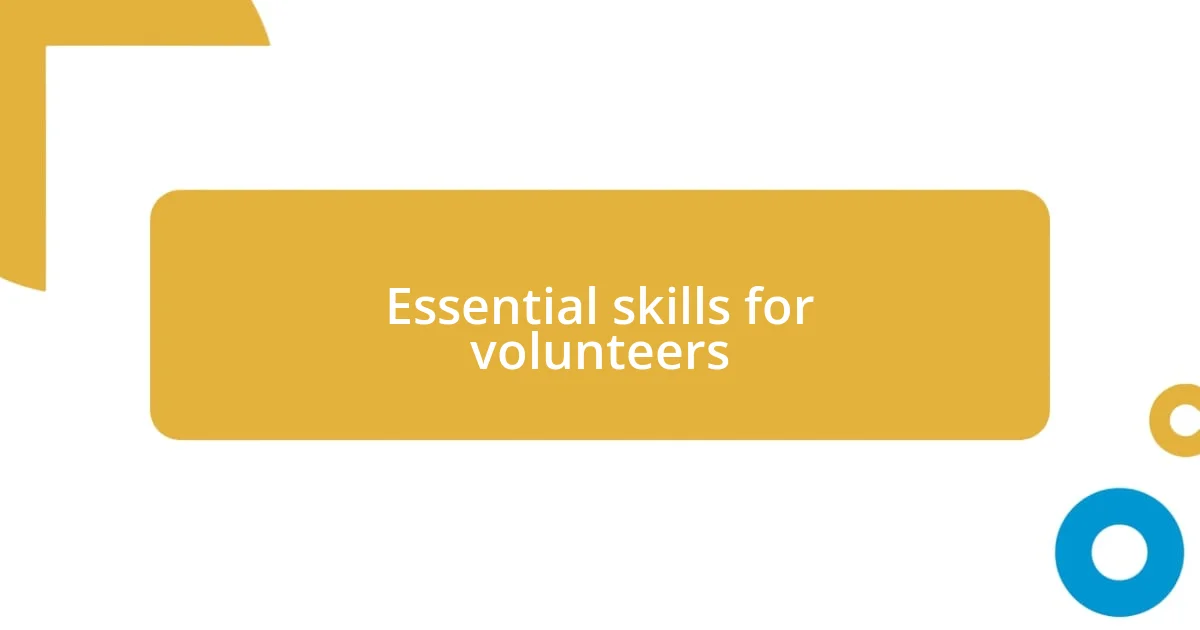
Essential skills for volunteers
Volunteering requires a diverse skill set that can significantly enhance your experience and impact. I’ve often found that soft skills, like communication and teamwork, are just as vital as technical ones. For instance, during a community cleanup, I noticed how our coordination made the difference between chaos and efficiency. When everyone pitched in with clear guidelines, we not only cleaned up faster but also forged connections that made the day memorable. Have you reflected on how your interpersonal skills can promote a positive atmosphere?
Here’s an essential skills checklist that can guide you as you prepare for your volunteer role:
- Communication: Express ideas clearly and listen actively to others.
- Flexibility: Be open to adapting your plans based on the organization’s needs.
- Problem-solving: Think creatively to overcome obstacles that may arise.
- Team collaboration: Work harmoniously with diverse groups to achieve common goals.
- Empathy: Understand and share the feelings of those you serve, enhancing the connection and support.
Each of these skills, I believe, plays a crucial role in not just getting the job done, but in enriching the entire volunteer experience.
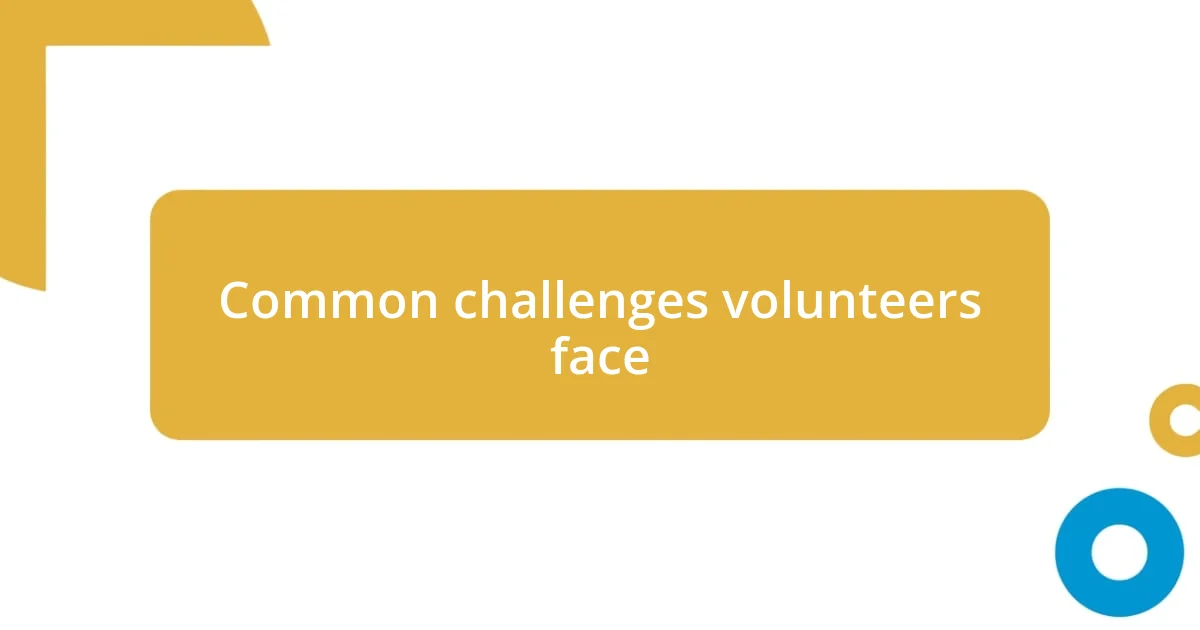
Common challenges volunteers face
Volunteers often encounter various challenges that can make the experience both rewarding and daunting. One common hurdle is the emotional toll of witnessing the hardships faced by the communities they serve. I recall feeling a wave of helplessness after supporting families affected by homelessness. It was painful to hear their stories, and sometimes I questioned whether my contributions were truly making a difference. Have you ever found yourself overwhelmed by the circumstances of those you’re trying to help?
Another challenge can be the misalignment between volunteer expectations and reality. I once participated in a program where I envisioned directly impacting students’ lives. However, I ended up performing administrative tasks far removed from the engagement I craved. This experience made me realize that clear communication about roles and responsibilities is essential. Have you ever faced a situation where your expectations didn’t match the actual experience?
Finally, I think time management is something many volunteers overlook. Juggling a busy schedule can lead to feelings of guilt or frustration, especially when unforeseen commitments arise. I’ve experienced moments where I had to choose between my volunteer work and personal responsibilities, and it stressed me out. Finding that balance is crucial for sustaining the motivation to continue volunteering. Have you determined how to prioritize and manage your time effectively in your volunteer endeavors?
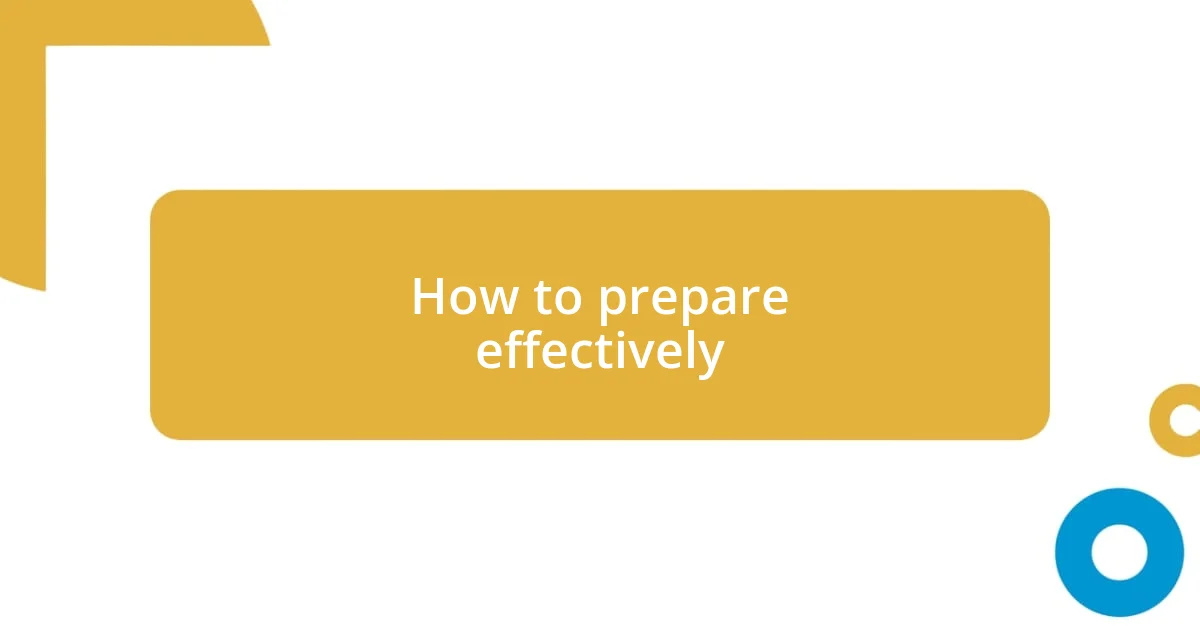
How to prepare effectively
Preparing effectively for a volunteer role is so much more than just showing up. I wish I had known to dig deeper into the organization’s mission and values before I even signed up. For instance, when I first volunteered at a food bank, I assumed my role would be strictly manual labor. However, understanding the underlying reasons for food insecurity helped me connect on a more profound level with the people I was serving. It changed how I approached each day. Is there a way you can learn about the cause before you jump in?
Another key preparation tip is to know what resources are available to you. I remember feeling completely unprepared before my first community gardening project, unsure of what tools or information I would need. By reaching out beforehand, I discovered that the organization encouraged volunteers to share their skills and knowledge, which turned out to be a fantastic way to build connections. What resources might you tap into to feel more equipped?
Finally, I learned the importance of setting personal goals before volunteering. Initially, I thought it was only about contributing to the greater good, but I found that having specific objectives helped me stay motivated. For example, during a conservation project, my goal was to learn about local ecosystems while making a difference. This focus kept me engaged and ultimately enhanced my experience. Have you thought about what you want to achieve personally through your volunteering journey?
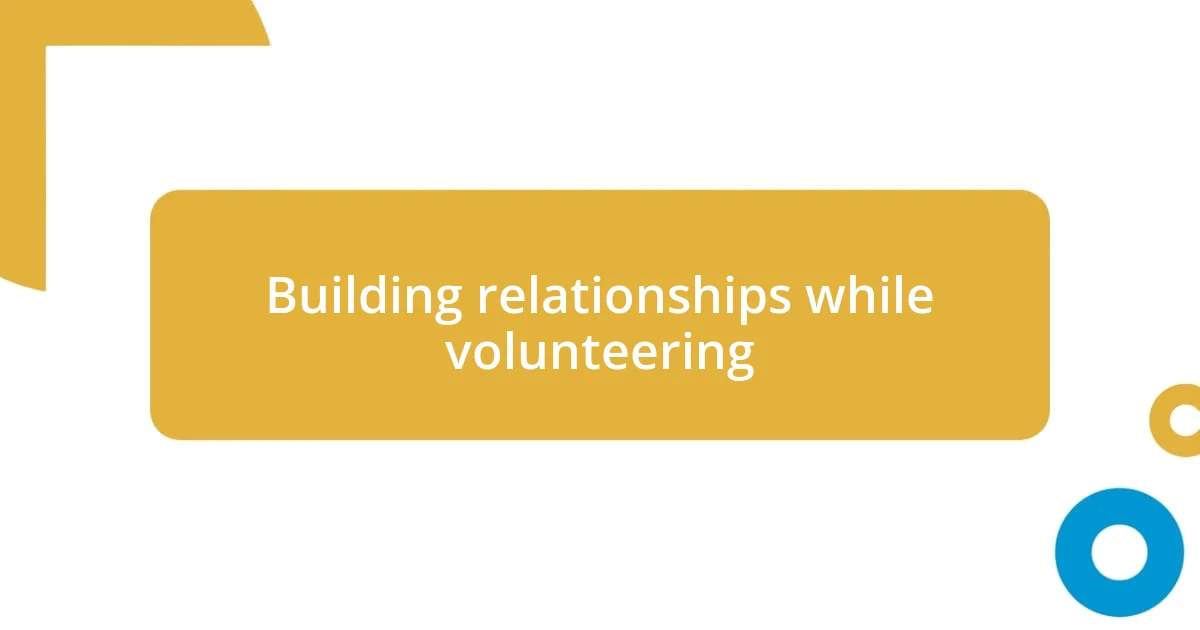
Building relationships while volunteering
Building relationships while volunteering is truly one of the most enriching aspects of the experience. I remember my first day at a homeless shelter; I was nervous and unsure of what to expect. But as I started interacting with both the staff and the guests, I found that sharing a simple meal or listening to their stories broke down walls. This connection not only made the experience more meaningful for me but seemed to provide comfort to those I interacted with as well. Have you ever noticed how a genuine smile or even just eye contact can create an instant bond?
As I progressed in my volunteering journey, I discovered that building relationships goes beyond just the individual interactions. For instance, while helping organize community events, I began to collaborate with other volunteers. We shared our experiences and learned from one another, which transformed our simple tasks into a shared mission. It was remarkable to see how these relationships evolved over time, turning acquaintances into friends. Have you ever experienced a shift from just working alongside someone to truly connecting with them?
Moreover, I’ve come to realize that vulnerability plays a significant role in forging deep connections. There was a moment during one of my volunteering stints when I shared my own struggles with anxiety while supporting a mental health initiative. To my surprise, many others opened up about their challenges as well. This honesty forged a powerful sense of community and trust among us. Have you considered how sharing your own experiences can create a safe space for others to do the same?
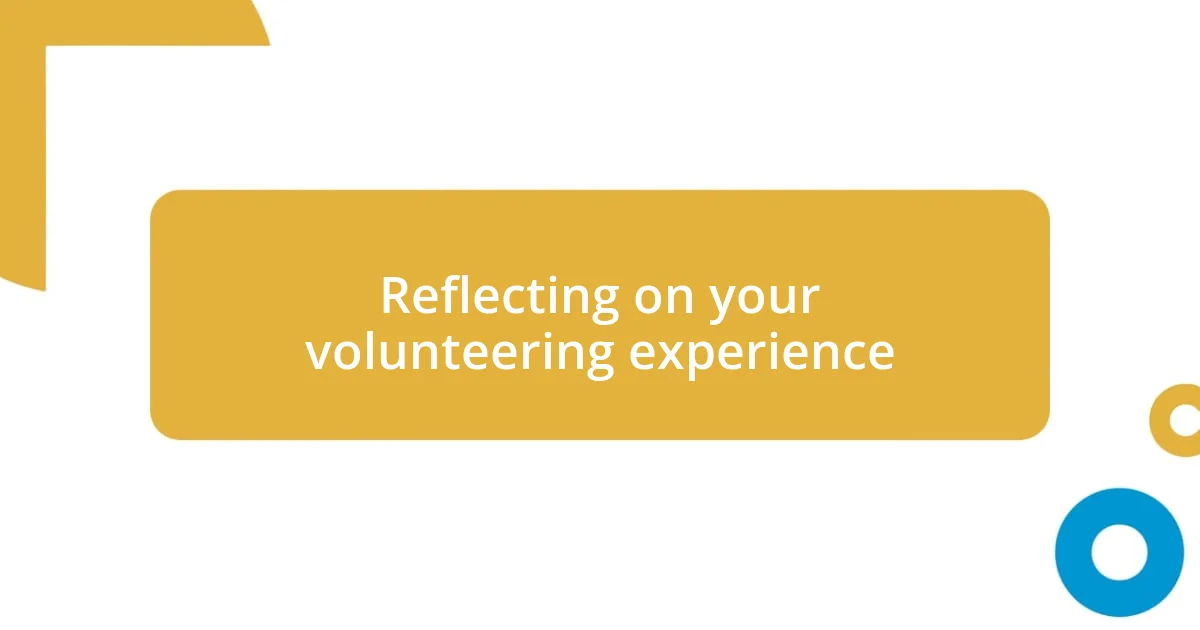
Reflecting on your volunteering experience
Reflecting on my volunteering experiences often brings a mix of emotions and realizations. After working at an animal shelter, I found myself questioning the impact of my efforts. I vividly remember one particular day when we rescued a neglected dog, and I realized that even small actions can lead to significant changes. Have you ever had a moment where you recognized the ripple effect of your contributions?
As I looked back on my time volunteering, I started to appreciate the lessons learned beyond the obvious tasks. It wasn’t just about assisting; it was about adapting and listening. During a literacy program, I stumbled upon the beauty of patience while helping a child grasp reading. That moment when they finally pronounced a tricky word was more rewarding than I anticipated. What unexpected lessons have you gathered from your own volunteering moments?
In reflecting on my journey, I’ve learned the value of feedback—both giving and receiving. Shortly after a community clean-up event, my supervisor shared how my enthusiasm motivated the group. I was taken aback; I hadn’t realized my energy could inspire others. It prompted me to be more self-aware in future roles. Consider how feedback could guide you in enhancing your own volunteering endeavors.
